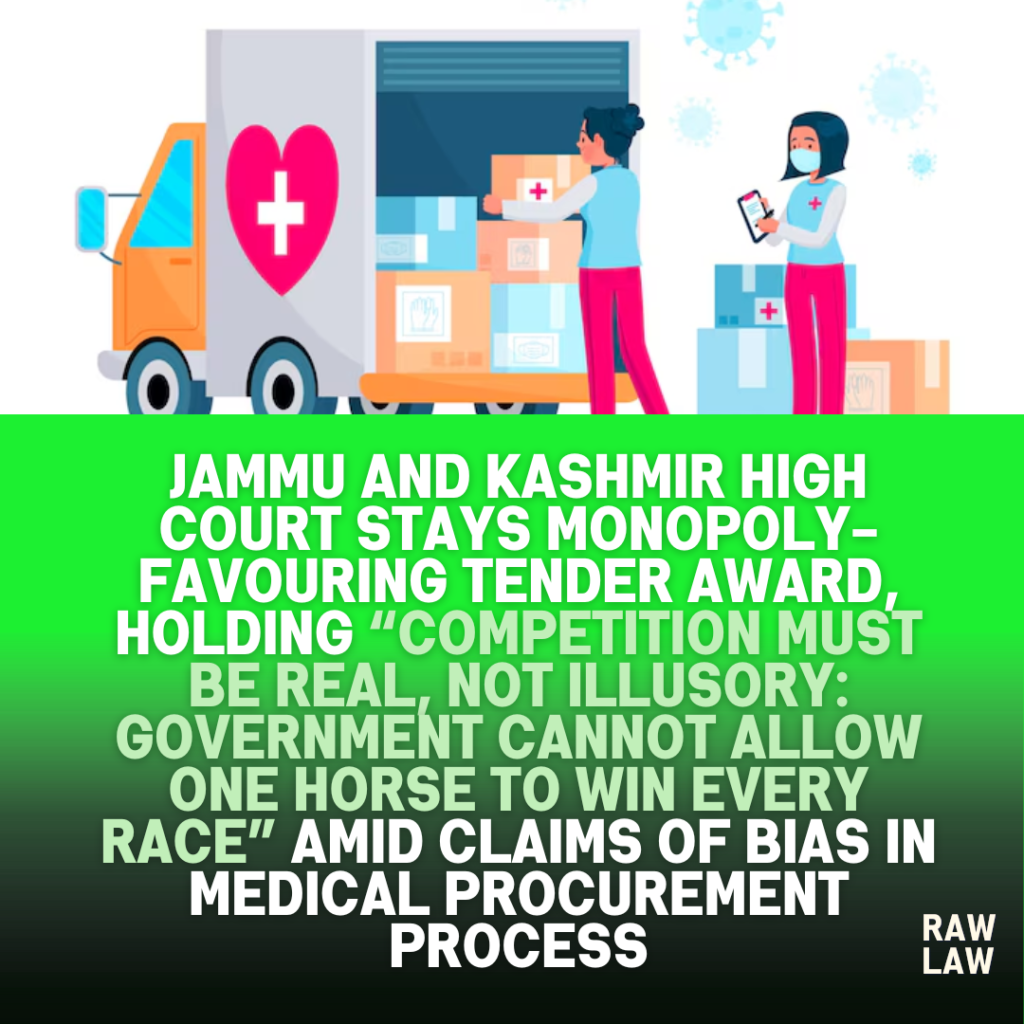Court’s Decision
The Jammu and Kashmir High Court set aside the tender process awarding the contract exclusively to Johnson & Johnson Pvt Ltd and S.R. Technomed for the supply of suture materials, despite Healthium Medtech Ltd.’s participation and globally recognised credentials. The Court directed the Jammu and Kashmir Medical Supplies Corporation Ltd (JKMSCL) to conduct a fresh, transparent technical evaluation of all eligible bidders’ samples and only thereafter open financial bids, ensuring fair opportunity to compete. The Court underscored that monopoly and exclusion of other bidders on vague “time-tested” grounds cannot override public interest, quality-price balance, and Article 14 protections.
Facts
Healthium Medtech Ltd, a globally recognised suture manufacturer, participated in a JKMSCL tender for supplying suture materials. Despite Healthium meeting the technical and financial qualifications with robust credentials (largest non-captive surgical needle manufacturer globally and No. 4 in sutures worldwide), its bid was excluded from financial consideration, while contracts were awarded solely to Johnson & Johnson and S.R. Technomed. Healthium alleged that JKMSCL repeatedly extended bid submission deadlines to favour these entities, and failed to call for or evaluate samples from all bidders as mandated by the tender, approving only select multinationals under vague pretexts like “time-tested usage.”
Issues
- Whether JKMSCL’s exclusion of Healthium’s bid violated principles of transparency, fairness, and equality under Article 14.
- Whether the tender process, favouring a single supplier for decades, was arbitrary and anti-competitive.
- Whether public procurement in health can prioritise “time-tested” suppliers without objective evaluation of other qualified bidders’ products.
Petitioner’s Arguments
Healthium argued:
- The tender process violated Clause 16, mandating sample evaluation from all technically qualified bidders.
- The consistent award of tenders to Johnson & Johnson created a state-sponsored monopoly, eliminating competition at the cost of public funds.
- The tender process lacked transparency and violated Articles 14 and 19(1)(g) by excluding Healthium without valid justification.
- Prior Supreme Court and High Court judgments mandate equal treatment of bidders and fair, transparent tender processes.
Respondent’s Arguments
JKMSCL and Johnson & Johnson argued:
- The Technical Committee’s expert opinion favoured Johnson & Johnson based on their longstanding use and perceived safety in surgeries.
- Judicial review should not interfere with technical evaluations by experts.
- Healthium did not submit samples when eventually called, forfeiting its claim.
- Quality and safety outweigh price considerations in medical procurement.
Analysis of the Law
The Court analysed:
1. Tata Cellular v. Union of India (1994) and Ramana Dayaram Shetty v. IAAI (1979), affirming that tender processes must be fair, transparent, and non-arbitrary.
2. The importance of judicial review over the decision-making process, especially when public law elements intersect with contracts.
3. Article 14 demands non-discrimination, and even in tenders, the State cannot create monopolies absent objective justification.
Precedent Analysis
- Tata Cellular v. Union of India (1994): Judicial review is available to ensure non-arbitrariness in government contracts.
- Ramana Dayaram Shetty v. IAAI (1979): Public authorities are bound by Article 14 in all actions, including tenders.
- ABL International Ltd. v. ECGC (2004): Writ jurisdiction extends to contractual matters when there is arbitrariness or constitutional violations.
- M.P. Power Management Co. v. Sky Power (2023): Judicial review ensures fairness, transparency, and reasonableness in administrative decisions.
These cases underscored the duty of the State to ensure fair competition and transparency in public procurement, supporting the court’s intervention in the present case.
Court’s Reasoning
The Court found:
- The persistent exclusion of other bidders and exclusive reliance on Johnson & Johnson without comparative evaluation over decades led to a state-facilitated monopoly.
- JKMSCL violated tender clauses by not calling or evaluating samples from all bidders, instead using “time-tested usage” as a blanket justification.
- Competition must be genuine, not illusory, especially in public procurement, where price and quality must be weighed transparently.
- The monopoly fostered by the State stifles innovation, restricts economic growth, and violates constitutional protections under Article 14.
Conclusion
- The Court set aside the tender award in favour of Johnson & Johnson and S.R. Technomed.
- Directed JKMSCL to re-evaluate all qualified bidders’ samples transparently within a time-bound framework.
- Clarified that patient safety and quality remain paramount but cannot be used as pretexts to perpetuate monopolies without objective evaluation.
Implications
- Reinforces transparency, non-discrimination, and fairness in public tenders in the health sector.
- Prevents state-supported monopolies in critical healthcare procurement, ensuring competitive pricing and innovation.
- Sets a precedent that even long-standing suppliers cannot be favoured absent clear, objective comparative evaluations.
FAQs
- Can government tenders favour a single supplier on grounds of “time-tested usage”?
No. The High Court held that the State cannot perpetuate monopolies on vague grounds and must transparently evaluate all qualified bidders’ products.
- What was the key violation by JKMSCL in this tender?
JKMSCL failed to call and evaluate samples from all qualified bidders and excluded Healthium’s bid without transparent, objective assessment, violating Article 14.
- How does this judgment impact public procurement in healthcare?
It ensures government tenders in healthcare maintain transparency, encourage competition, and prevent monopolies, balancing quality with fair pricing.
